Professor Pamela Newkirk is many things, but at her core, she is an award-winning journalist, a researcher, and a writer. Her latest book Diversity Inc. The Fight For Racial Equality in the Workplace was included on TIME magazine’s “Must-Read” books of 2019 and Strategy+business magazine’s Best Business Books 2020. She’s written previous award-winning books like Spectacle: The Astonishing Life of Ota Benga, which was awarded a 2016 NAACP Image Award and named a Best Book by NPR, The Boston Globe, and the San Francisco Chronicle. It was also selected as a New York Times Editor’s Choice.
I was lucky enough to read one of Pamela Newkirk’s books early in my career. It was her third book Letters From Black America and it is a treasure. It contains a letter from W.E.B. Du Bois written in 1914 to his daughter attending boarding school in the UK, giving her wise counsel on how to navigate the newness of the situation and deal with people unaccustomed to interacting with a Black girl. It’s a must-read for anyone who has ever felt excluded or ended up in spaces where they are in the minority. The book highlights the areas in which Professor Newkirk excels – researching and writing about the issues that affect African Americans.
Professor Newkirk spoke with Her Agenda to share her thoughts on diversity, hope, and writing.
Her Agenda: You’ve written about five books to date. Is there a common theme that you found across all your books?
Prof. Pamela Newkirk: All of my books grow out of my interest in media portrayals, and just the way African Americans are depicted in American life – whether it’s through television commercials or literature or film, or the news media. I guess all of my books have addressed that in some way. My first book did it very pointedly, looking at the impact of race in the newsroom. And then when I did the next one, A Love No Less, instead of looking at how Black people are perceived in the world, it’s a look at how Black people express their humanity through love letters. Love is one of the most underrepresented facets of African American life.
-These portrayals perpetuate stereotypes that result in racial profiling, mass incarceration, and the police killings of unarmed Blacks. And of course, they also help legitimize and sustain systemic racial disparities in health, wealth, income, employment, and education.
And then Letters From Black America was just an expansion of that. It’s an intimate portrait of African American life through their letters. Looking at how we address our family members and how we look at politics. And so, it was a way of just getting at Black life without that media filter. It seems that we always have to go through some filter, right? And then, of course, Spectacle is going back to depictions. I mean, there’s no way that this young African would have been exhibited in a monkey house without the barrage of negative media depictions of Black people.
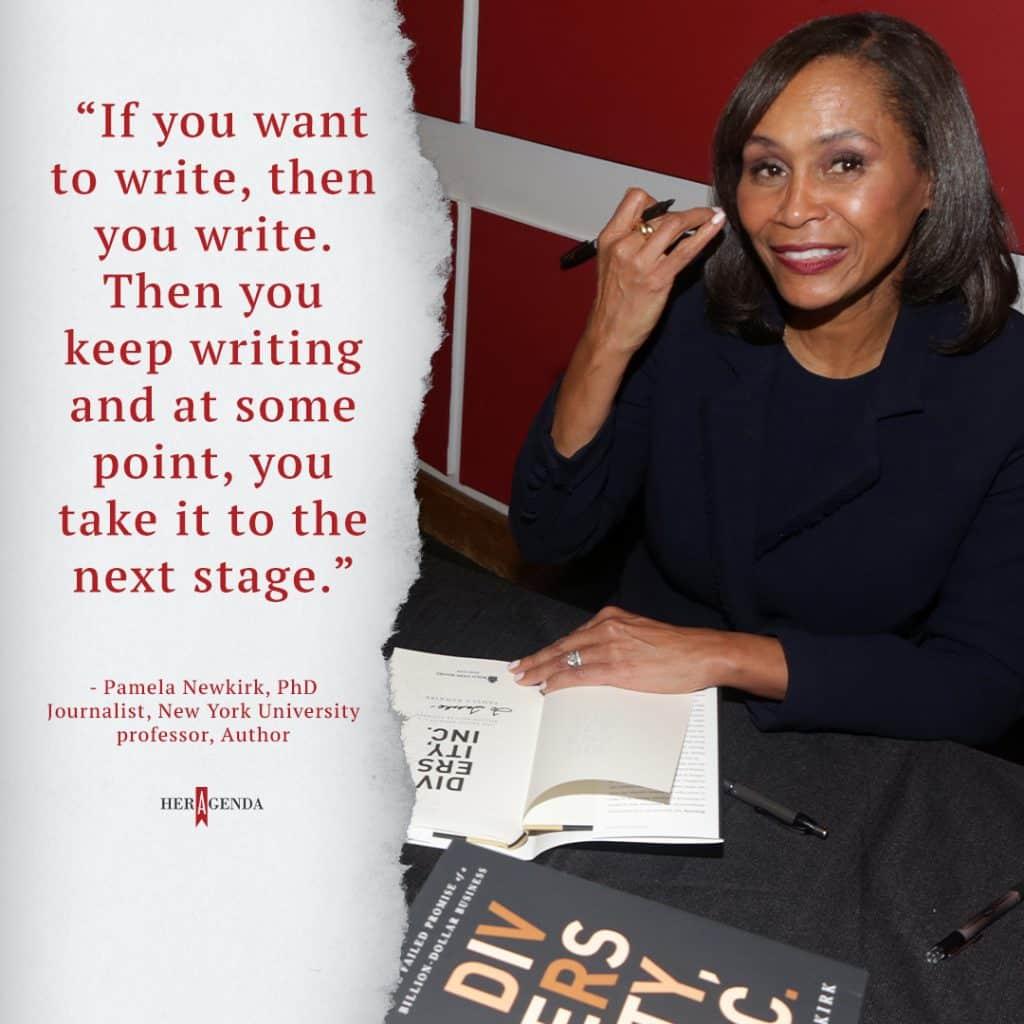
And then Diversity, Inc., still is dealing with those depictions because discrimination, and all of the ways that we are not valued in the workplace, or included in the workplace, it still goes back to this embedded ideology. So, that is probably the throughline through all of my work. It’s looking at how we are viewed in American life and how this prism has allowed others to define who we are. And it has real-world consequences.
These portrayals perpetuate stereotypes that result in racial profiling, mass incarceration, and the police killings of unarmed Blacks. And of course, they also help legitimize and sustain systemic racial disparities in health, wealth, income, employment, and education.
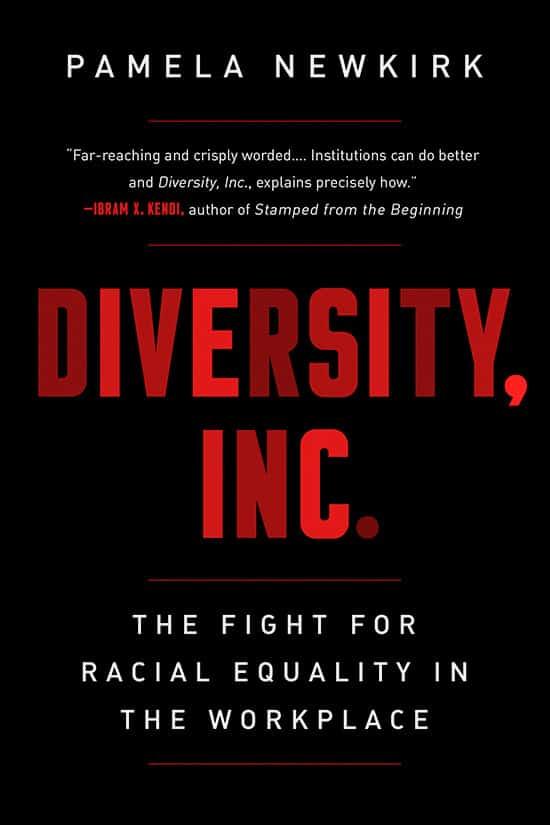
Her Agenda: It’s always been relevant, but it’s almost like the world caught up with what you’ve been trying to depict.
Prof. Pamela Newkirk: Some people have said my work is prescient, but issues of injustice and demeaning depictions have shadowed us from the beginning of the American experiment. We are still navigating centuries of inferiority theories steeped in racist pseudo-science that was taught at the most elite universities and used to rationalize our oppression. That embedded ideology continues to be used to justify police brutality, mass incarceration, and disparities in income, health, opportunity, and every social indicator. It all goes back to a pernicious ideology of European preeminence and African inferiority baked into our education system which permeates our culture.
-We are catching up as a society, we are beginning to see how this toxic ecosystem has had this adverse impact on Black lives.
I think we are catching up as a society, we are beginning to see how this toxic ecosystem has had this adverse impact on Black lives. We’re seeing Confederate statues finally come down because people are beginning to recognize the extent to which the ideology they express continues to haunt us. We’re seeing ‘Aunt Jemima’ and ‘Uncle Ben’ being removed from boxes of products because that’s a demeaning depiction of Black life. And so, in that way, many are beginning to connect the dots between this offensive iconography and the way Black people are regarded in society.
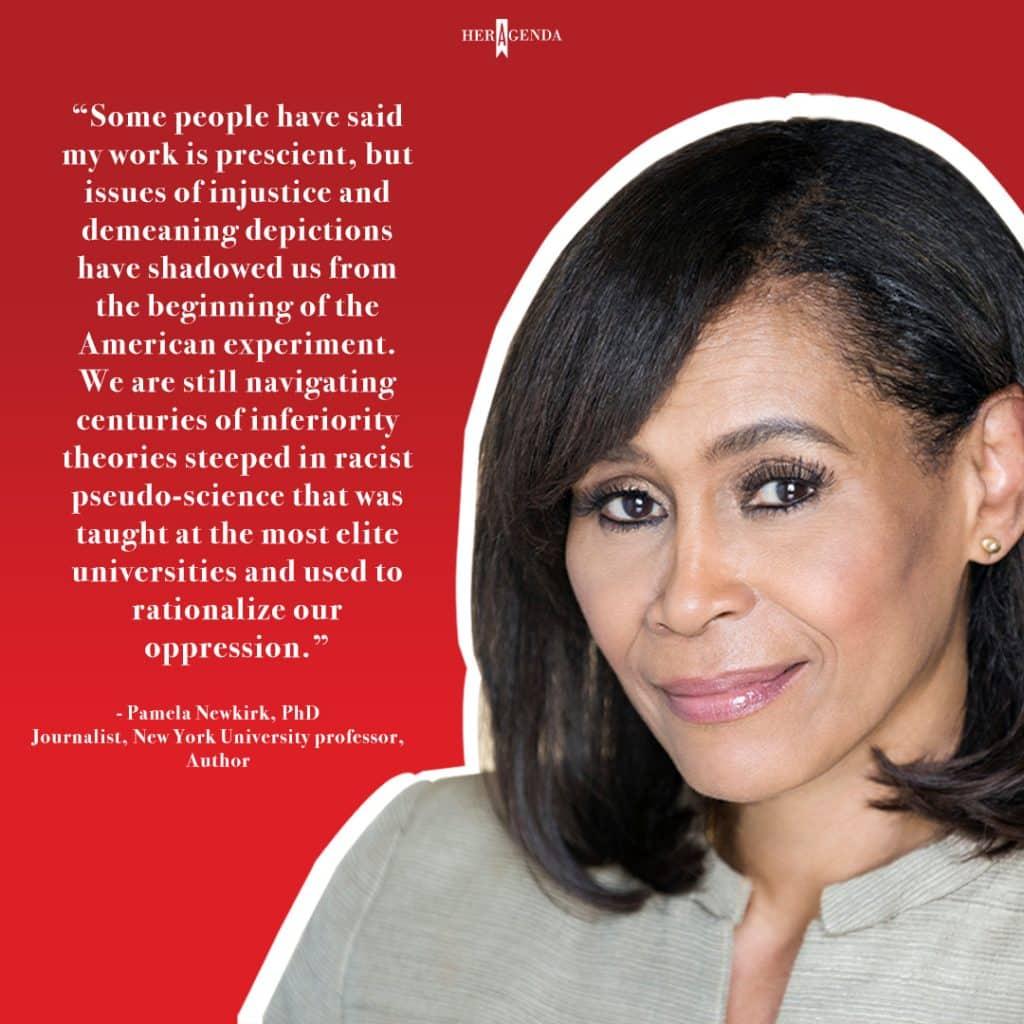
Her Agenda: I love it when you say “Black lives without that filter.” The ability to see our lives without that filter. Her Agenda is targeted to millennial women and we’re saying to these women, go out there in the world and make your own agenda. Do you have any general advice for them as to how to remove that filter?
Prof. Pamela Newkirk: That is a different kind of situation because you’re going into the belly of the beast. Right? You’re in there. And so, my interest in history is: how did we survive so much? How are we still here? How are so many of us still thriving? What is it that is making that possible? So, you almost have to be fortified by the knowledge of our history. I find our history fortifying. What would my excuse be for not making it when I look at what my ancestors had to overcome to make it? So that has interested me, but it has also fortified me.
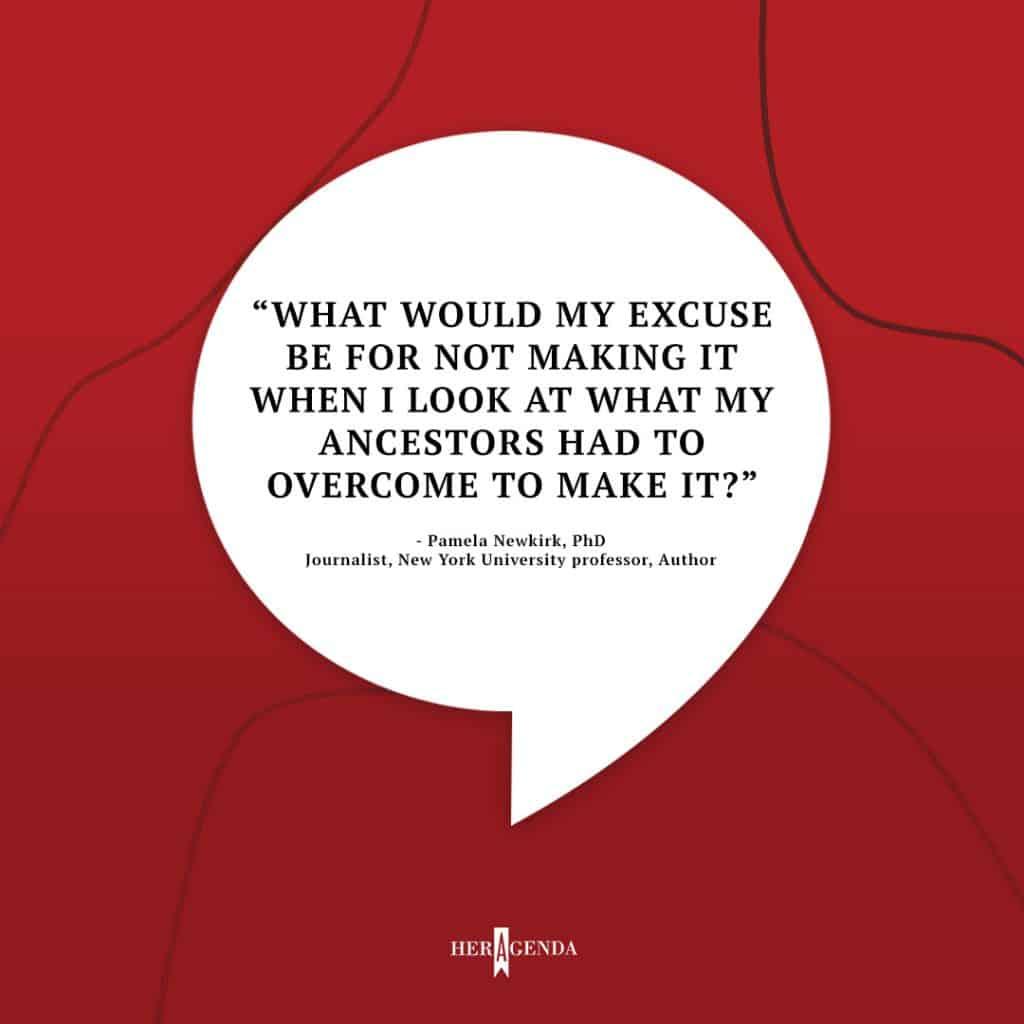
In many ways, we have greater advantages than our ancestors could have even imagined. But without that perspective, if all you see is the adversity, if all you see is the struggle and you’re not gaining that wisdom of how to overcome these hurdles, then all you’re going to see are the hurdles. History is such a great teacher.
Her Agenda: I want to discuss your latest book, Diversity, Inc., was there anything you were surprised to learn about in writing that book?
Prof Pamela Newkirk: What surprised me the most is just how bad the numbers were across industries. I knew it was bad in journalism because I worked in journalism. I knew it was bad in academia because I worked in academia. I just did not expect the numbers to be that horrific across fields. And, also for the needle not to have moved across so many decades. And in retrospect, I’m surprised by my surprise, because I knew things were bad, but I had no idea just how bad. For example, when looking at Black law partners, the numbers move from 1.7 percent to 1.8 percent. I kept going back to the numbers because they were just so unbelievable to me.
Another surprise was that the fields that consider themselves the most progressive are the least diverse. Like fashion, Hollywood, a lot of the so-called progressive fields are doing the worst at this, and corporate America is so far ahead of those fields.
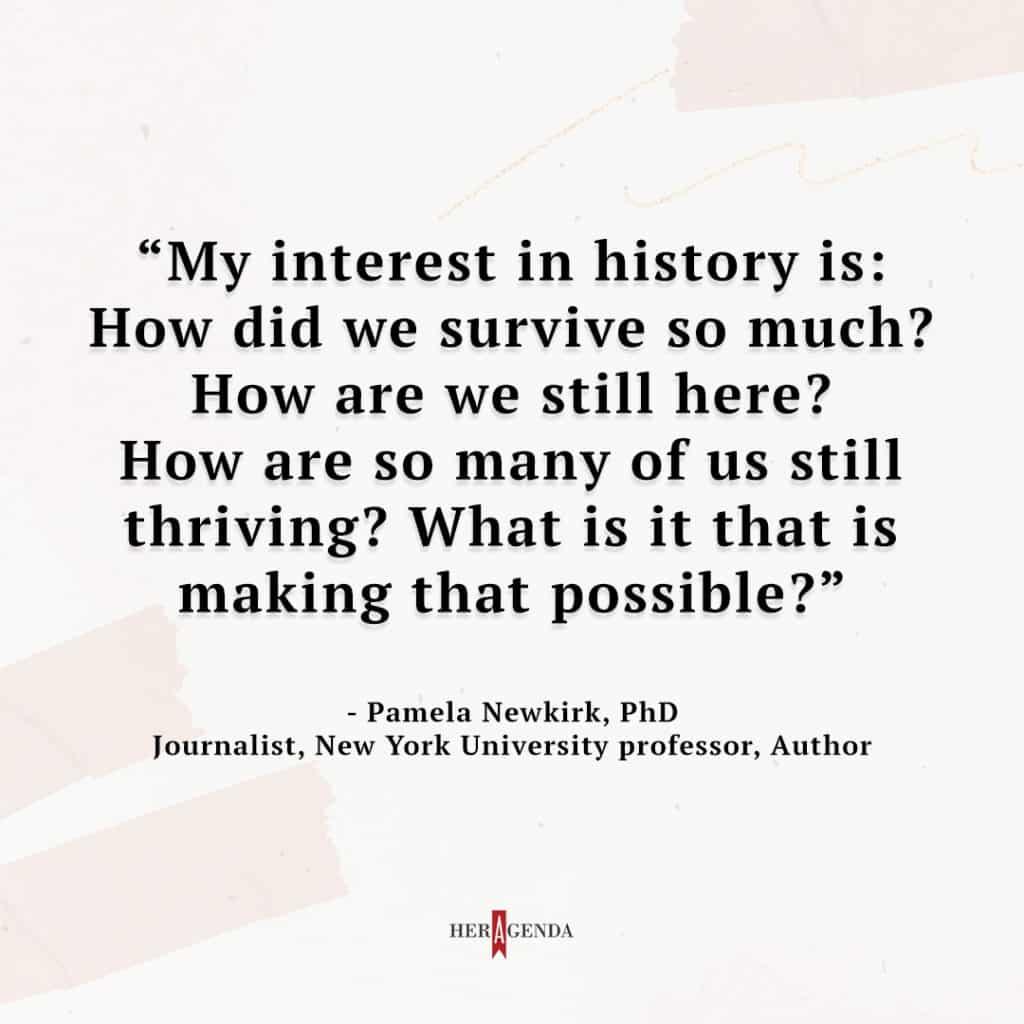
Her Agenda: Given that it’s a multilayered complicated problem, what advice, what one thing would you say to people who are working in the diversity, equity, and inclusion field?
Prof. Pamela Newkirk: [I would tell them] to shift the focus from trying to change how people feel about people of color or women or LGBTQ, to what we can do to disrupt patterns of bias against those groups. So instead of you trying to change how I think about these people, the job should be trying to figure out how we get more of these people into the pipeline and into the workplace because that is where the education will happen. When people have more interactions with difference that is going to teach them how to deal with difference.
-Shift the focus from trying to change how people feel about people of color or women or LGBTQ, to what we can do to disrupt patterns of bias against those groups.
You cannot do it in a training session. And in fact, the research is showing that diversity training at best can work for a day. And at worst, it makes the problem much worse by causing greater tensions in the workplace. I don’t think it’s the place for that kind of training. I don’t think you can train people in an hour or a day or a week to rid themselves of these embedded ideas around race. The way you can do it is by having more interaction with people from different races. Diversity is the cure for the problem.
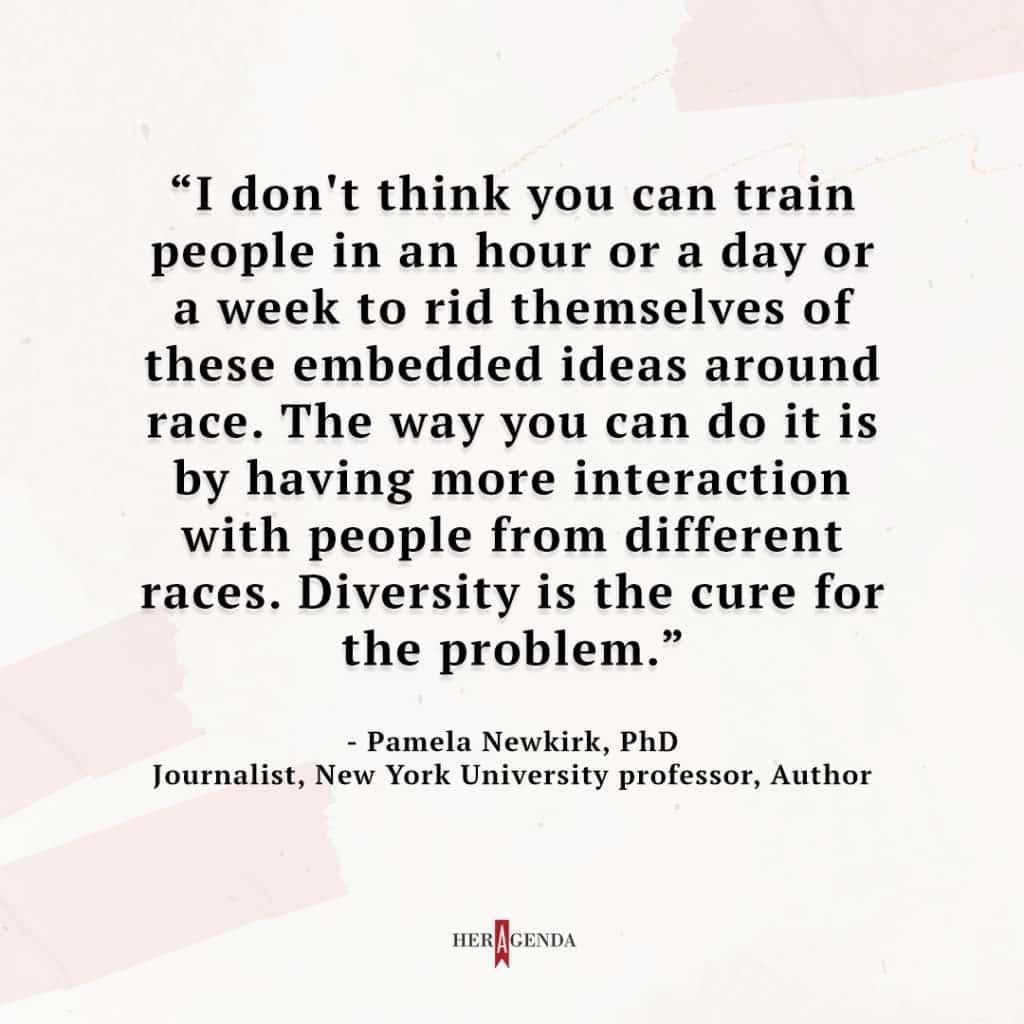
Her Agenda: What advice do you have for millennials who want to see something change in their organization, but they look around, and realize this is not happening. And I know you’ve already talked about the knowledge of our history and learning from that, is there another thing you can do when you’re feeling disillusioned?
Prof. Pamela Newkirk: We’ve all been in a state of disillusionment. That has been the history of Black people in this country. You go from hope to hope, to effort, to some victories and some disillusionment. It’s all part of the struggle. For young people, I think they do have more weapons than previous generations because they are more knowledgeable and they do place greater demands on these organizations to be more inclusive, to be more diverse. I mean, now they’re calling the shots. They don’t want to work for places that discriminate or that they don’t feel are representative and inclusive. And I think that is putting pressure on organizations that want the best talent to be more inclusive.
So, I think they can use that as a weapon. I see them doing it every day. I see them turn down jobs. I see them not go to places because of this and I think it’s going to affect these companies if they really do want the best talent because young, Black, and well-educated professionals are in demand.
The companies that will hire people of color are looking for the “best.” And I think that the young African Americans who are really well equipped have choices. So, if you want me, then you have to do certain things. I see it with my own kids. I mean, they are far less tolerant than earlier generations. And I think that’s a good thing.
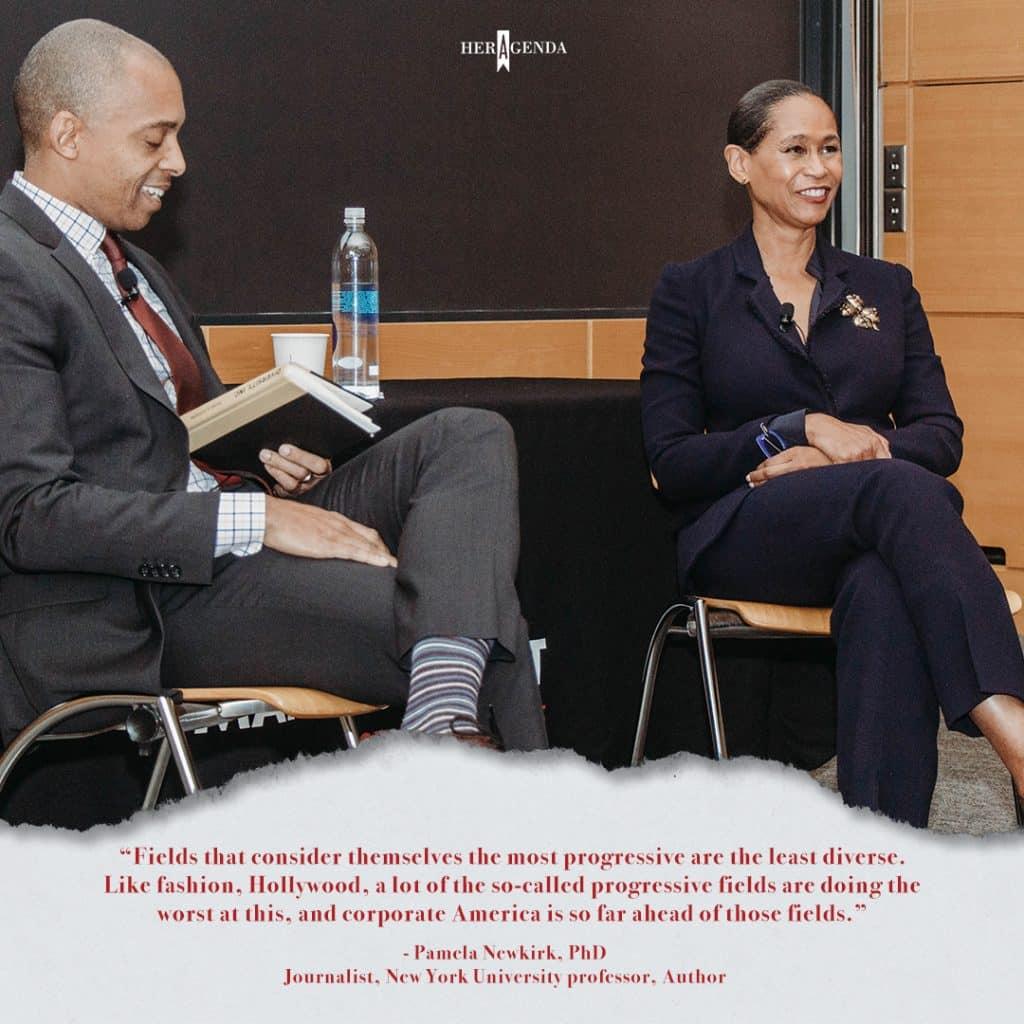
Her Agenda: Finally, you’ve written so many great, solid, well-researched books. What advice do you have for potential authors, people reading this who want to write?
Prof. Pamela Newkirk: I am a writer. I’m not a plumber who writes or a physician who writes books. I’m a writer who writes books. So writing is an essential part of me. Since I was a kid, I’ve been writing poetry and short articles and short stories since I was nine, 10, or 11.
So, I’ve always been a writer. And then, I was a writer who then found a career as a journalist. I think people who want to write, it’s a compulsion. If you want to write, then you write. Then you keep writing and at some point, you take it to the next stage.
[Editor’s note: This interview has been edited for length and clarity.]









